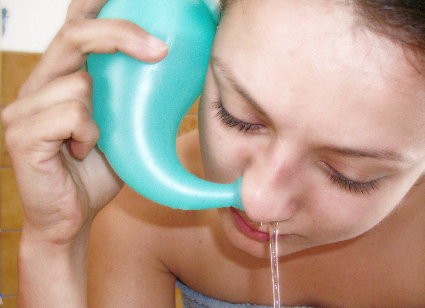
(Photo: Wikimedia Commons/Aikhan)
Those who do nasal rinsing should be very careful with their solution. According to an expert, the process can be deadly as it can introduce germs into the body, and the nose is dangerous.
Risks of Nasal Rinsing or Nasal Irrigation
Nasal rinsing or irrigation is a simple and safe method for cleaning your sinuses. It can assist in easing the symptoms of allergies, colds, sinus infections, and other upper respiratory ailments.
If you wish to try nasal irrigation, neti pots, rinse bottles, and pre-filled containers are all great options. However, Adam Taylor, Professor and Director of the Clinical Anatomy Learning Centre at Lancaster University, warned that nasal rinsing could be deadly because it can introduce germs into the body when not done with sterile water. He noted that a few individuals with weak immune systems died from diseases they caught through nasal irrigation.
Any sterile liquid used to rinse the nasal passages can raise the risk of infection. Numerous microorganisms that aid in protecting body surfaces can be found in the nose. Rinsing could eliminate or destroy these beneficial bacteria, opening the door for infections to enter the body.
The greatest danger, though, comes from potential pathogens in the drink. Thus, any liquid put up the nose needs to be sterile. For example, sterile nasal sprays widely accessible from pharmacies are not linked to this risk. However, tap water isn't sterile.
A recent study discovered ten individuals who used nasal rinsing in the US and contracted Acanthamoeba amebae. Most healthy individuals have a low risk of infection, but those with compromised immune systems may die from this parasite infection.
Although 82 percent of US instances of the virus are fatal, three out of the 10 participants in the research passed away.
Negleria fowleri is another common amoeba in our surroundings. Even in generally healthy individuals, it has a death rate of 97% in instances that are detected. Fortunately, infections caused by this parasite are also uncommon. However, swimming in fresh and tap water for nasal rinses has been connected to infection.
Additionally, there probably are far more illnesses and fatalities in nations with poor access to clean water.
ALSO READ: How to Reduce Microplastics in Tap Water? Expert Shares Easy Way to Remove 90% of Tiny Plastic
When Is Nasal Irrigation Not Safe?
Nasal irrigation is generally safe, but one must keep the rinsing device clean and use a secure and treated water source. Harmful microorganisms may thrive in water, even in drinking water that has not been correctly filtered, treated, and disinfected.
In general, chlorinated tap water is safe for ordinary domestic purposes like drinking, food preparation, showering, and bathing. However, it is not suitable for specialized purposes like cleaning or restoring contact lenses and nasal irrigation.
When doing nasal rinsing, one should use distilled or sterile water, boiled and cooled tap water, or filtered water with an absolute pore size of 1 micron or smaller.
Also, nasal irrigation should be clean and dry before treated water is added to it. You can dry the interior using a paper towel or leave it open to air dry between uses. Make sure that your hands are also washed, cleaned with soap, and dried before handling the treated water.
RELATED ARTICLE: Bored People Are More Likely to Donate Blood and Do Other Meaningful Tasks, Study Shows
Check out more news and information on MEDICINE & HEALTH in Science Times.














